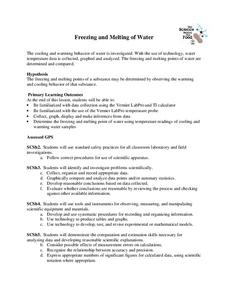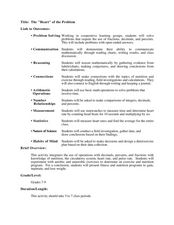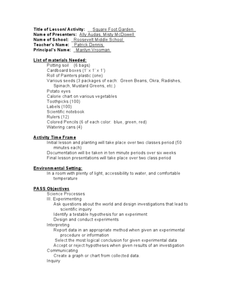Curated OER
Junk Food Math
Learners use Skittles candies as they explore estimation and percentages. In this math lesson plan, students sort, count, and chart Skittles candies to learn about estimation and study percentages.
Curated OER
Nutrition Labels - Fats in your Diet
Students analyze the American diet and the amount of fat content that we choose to include in our food. Eating habits are monitored and results compared to the recommended amounts.
Curated OER
Rethink Your Drink
Young scholars identify the contents of popular drinks. In this health instructional activity students learn how to read labels and devise ways that they can drink more water.
Curated OER
Medicare Reform
High schoolers calculate how much of each paycheck is deducted into the Medicare system, explain the need for health insurance and Medicare, and work in small groups to develop their own plan to reform Medicare.
Curated OER
Stats on Reduced-Fat
Students demonstrate an understanding of the Five-Number Summary and Box-Plots after analyzing data from nutrition labels, forming a hypothesis and supporting it. They decide if there is a significant difference between reduced fat and...
Curated OER
You Are What You Eat!
Students calculate the calories in food samples and plan a meal based on the calorie amount. In this calories lesson plan, students also devise a work out program to burn off the calories.
Curated OER
What's In Your Grocery Bag?
Students explore the global implications of consumer decisions when purchasing groceries. They examine labels of food products and discuss the wording on the labels. They calculate food miles of how far each ingredient in foods has...
University of Georgia
Freezing and Melting of Water
Examine the behavior of energy as water freezes and melts. An engaging activity provides a hands-on experience to learners. Collaborative groups collect data and analyze the graphs of the temperature of water as it freezes and then...
Curated OER
Galileo's Thermometer: Measuring the Density of Various Unknown Liquids
Sprouting scientists explore the concept of density by making mass and volume measurements for five different liquids. From these measurements, they calculate densities. They apply their learning to explain Galileo's thermometer works...
Curated OER
Economic Health Indicators: GDP and CPI Worksheet
Examine the nation's economic health using this GDP and CPI activity, which features helpful graphic depictions of complex concepts. The first 2 pages include 17 short-answer questions intended to guide reading from a text (not...
Curated OER
Can You Count on Cans?
How can a canned food drive be connected to math? It's as simple as counting and organizing the cans! Children demonstrate their ability to sort non-perishable foods into categories that include soup cans, vegetable cans, boxed items,...
Curated OER
Classroom Supplies
Challenge young mathematicians to buy classroom supplies by staying within the means of a $1,000 budget. The mathematical activity provides learners with the opportunity to decide what items from the supply list would benefit a class of...
Curated OER
What's My Number?
Fifth graders use AppleWorks to stamp a given number to the thousandths place. They read, write and order integers, whole numbers and rational numbers. They represent place value using concrete or illustrated models.
Curated OER
Visual Representation of Reduced Fat
Students demonstrate their understanding of the Five-Number Summary and Box-Plots by analyzing different nutrition labels from regular and reduced fat items using graphing calculators.
Curated OER
Nutrients by the Numbers
Learners read and discuss an article on the amount of sugar in various food products. They compare the nutritional values of food products, calculate their daily intake of nutrients, analyze serving sizes, and compare/contrast their own...
Curated OER
Moooving to Low-fat Milk
Third graders complete two handouts. In this healthy beverages lesson, 3rd graders compare whole, two percent and skim milks. Students use labels to help choose healthy beverages. Students complete an "All About Milk" and "Calculating...
Curated OER
Trophic Ecology of Humans
students analyze the place of humans among the tropic levels by observing what we eat. They calculate the caloric content of several foods commonly eaten by humans and calculate the total energy cost to grow, process, transport, store...
Curated OER
Trophic Ecology of Humans
Students analyze the trophic level of humans by first calculating the kilocalories in own their lunch. They then calulate the kilocalories in a wide variety of foods found in grocery stores and compare the kilocalories needed to acquire...
Curated OER
The "Heart" of the Problem
Students create an exercise and nutrition program. In this interdisciplinary lesson, students use calculations of exercises plus their corresponding effects on the body and nutritional values of food to derive a health plan. Students...
Curated OER
Square Foot Garden
Students plant a garden and keep track of it. In this geometrical garden lesson plan, students collect data from their garden twice a week. They graph their finding and figure out how many square feet of growing space each person needs...
Curated OER
Nutrition
Students learn about good nutrition. In this biology lesson plan, students test samples of food to find out if they contain fat, test fruit juices for vitamin C and compare the vitamin C content of the juices, calculate the number of...
Curated OER
Math: Party Time!
Twelfth graders discover how to calculate the total costs for a party. They determine the unit prices of food and supplies, the quantities needed, and complete a chart displaying their findings. Students calculate the costs per serving...
Curated OER
Calories, Energy for Exercise and Life
Students calculate the number of calories they need daily and examine the impact of exercise on their caloric needs. They then determine if their daily caloric intake meets or exceeds their daily need.
Curated OER
Rethink Your Drink
Students examine the sugar content of common beverages. For this adult health lesson, students convert grams of sugar to teaspoons. They discuss the benefits of drinking water instead of soda and juices.

























